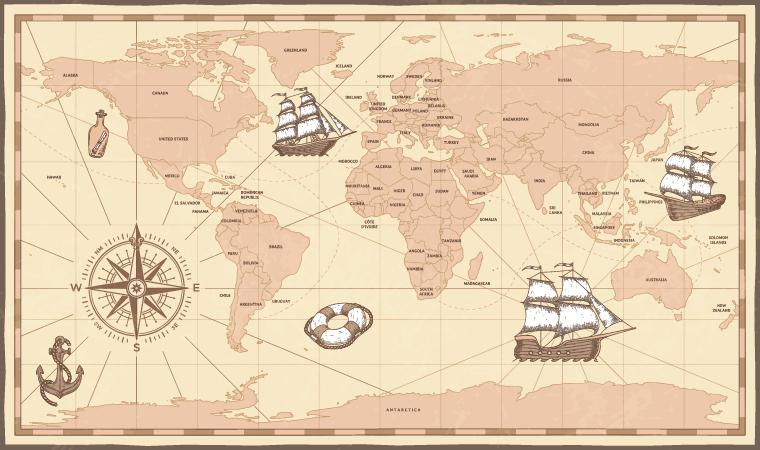The Exploitation Of Colonies For Economic Gain
“The sun never sets on the British Empire” was a common phrase used to describe the dominance the empire had worldwide. France, Belgium, Spain, and Portugal each had their share of colonies, and at one point, 85 percent of the world belonged to these European forces (Diallo, 2019). Many will tell you that the lasting impact was more positive than negative. Without interference, these countries wouldn’t be able to develop the infrastructure, education, scientific knowledge, and trade. However, that innovation came at the cost of control, exploitation, oppression, brutality, theft, enslavement, and cultural obliteration.
Western European nations prospered and industrialized because of the exploitation of colonies, which provided them with access to abundant resources, slave labor, and markets (Peddibhotla, 2022). This led to significant economic growth in colonial economies, which provided direct benefits to the industries and merchants of Europe. However, the colonial system resulted in significant harm to colonized regions, causing lasting economic and social damage. “By the late 19th century, over half of the British State’s revenue stemmed from its colonies. India’s share of the global economy shrank from 27 to 3 percent, and China’s share shrank from 35 to 7 percent. Europe’s share exploded from 20 to 60 percent” (Voskoboynik, 2018).
The atrocities that often accompanied colonization have had lasting effects on these countries and their people, sometimes referred to as the “scars of colonialism”. These scars can be seen in many aspects of society, including economic inequality, political instability, cultural erasure, and social injustice. It is essential to acknowledge and address these historical injustices in order to move towards a more equitable and just world.

The Historical Scars Of Colonialism
As formal colonialism ended and countries started gaining their independence, the processes for reclaiming cultural identities formed. However, after being stripped of their value system, many inhabitants of former colonies were lost in a schism between Western ideas and indigenous values (Solomons, 2021). Within this search for identity, an effort to whitewash the crimes of the previous regime started to manifest. After committing several atrocities, including genocide, against the Congolese people, King Leopold was forced to give up the colony known as the Congo Free State to the government of Belgium. The government held onto the State from 1902 until it gained independence in 1960. On his way out, King Leopold burned all documents associated with his brutal rule. “I will give them my Congo, but they have no right to know what I did there,” Leopold said (Voskoboynik, 2018).
The ignorance of these atrocities is often rooted in miseducation or flat-out cognitive dissonance. For example, many argue that the overall impact the British had in India was a positive one as it led to train infrastructure that is still used today. However, they cannot recognize that those trains were built to drain the resources from India to take them back to the United Kingdom. In the late 19th century, tens of millions of Indians died of famine. “If their bodies were laid head to foot, the corpses would cover the length of England 85 times” (Hickel, 2015). Simultaneously, British colonial policy forced the country to export record levels of food. The Congo genocide killed at least 10 million people–half the country’s population at the time (Gregoire, 2002). The genocide was designed to extract maximum levels of ivory and rubber.
The independence of these nations proved to be disorienting, as the process of decolonization was often rife with confusion and violence. The whole rationale for the colonial rule was to bring the benefits of civilization—“white man’s burden”—and shepherd people towards self-rule (Kennedy & DiConsiglio, 2016). Empires shrugged off the cruelty they imposed for hundreds of years through justifications and delusions. They claim that the process was managed with placidity, but the reality would suggest otherwise. The process of decolonization in various parts of the world was characterized by violence, conflict, mass migrations, and extensive human suffering. For instance, the Indian subcontinent, Colonial Algeria, Vietnam, and Angola all experienced significant death tolls and population displacement during their struggles for independence from colonial powers.
The Scars Of Colonialism Are A Current Reality
The death toll that arose in the fight for independence, along with the rushed plans for land division, are costs that are still being paid today. Many regions face long-lasting conflicts that have their roots in decolonization. Since independence and partition, there have been three wars between India and Pakistan. Experts agree that a future nuclear exchange is most likely to happen between those two nations (Krajick, 2020; Pulla, 2019). Tensions persist throughout the Middle East following the transition of the British colony of Palestine into the State of Israel. Those tensions show no signs of stopping. In the Congo, the collapse of Belgium’s rule resulted in ethnic rivalries. Congo is a vast country that still has never successfully integrated as a nation-state. Millions of people have died in conflicts in the Congo since their independence. Conflicts can’t be separated from decolonization (Kennedy & DiConsiglio, 2016).
Many have acknowledged that apologies and recognition are not enough. Reparations are needed as the development and prosperity of colonizing nations were built on the exploitation and oppression of their colonies. More than half a century on, the effects of colonialism are still felt today. The solution may not be imminent, but it is hard not to dwell on generations of hardships.
References:
- Diallo, S. “My Reflections on the Scars of African Colonialism.” News Decoder. 2019. Accessed Mar, 2023. https://news-decoder.com/africa-colonialism/.
- DiConsiglio, J. & Kennedy, D. “The Scars of Empires Past: Columbian College of Arts & Sciences: The George Washington University.” Columbian College of Arts & Sciences, 2016. Accessed Mar, 2023 https://columbian.gwu.edu/scars-empires-past.
- Gregoire, P. “A forgotten genocide: The Congo Free State”. Sydney Criminal Lawyers. December 15, 2022. Accessed Mar, 2023, from https://www.sydneycriminallawyers.com.au/blog/a-forgotten-genocide-the-congo-free-state/
- Hickel, J. “Enough of aid – let’s talk reparations”, Guardian. 2015
https://www.theguardian.com/global-development-professionals-network/2015/nov/27/enough-of-aid-lets-talk-reparations. Accessed Mar, 2023 - Krajick, K. “Even a Limited India-Pakistan Nuclear War Would Bring Global Famine, Says Study: Soot From Firestorms Would Reduce Faraway Crop Production for Years”. Columbia Climate School. MARCH 16, 2020. Retrieved from: https://news.climate.columbia.edu/2020/03/16/even-limited-india-pakistan-nuclear-war-would-bring-global-famine/. Access Mar, 2023.
- Peddibhotla, R. “75 Years Later, India Still Bears the Scars of Colonialism.” India Currents, August 15, 2022. https://indiacurrents.com/75-years-later-india-still-bears-the-scars-of-colonialism/. Accessed Mar, 2023
- Pulla P. “India-Pakistan nuclear escalation: where could it lead?” Nature. 2019 Sep;573(7772):16-17. doi: 10.1038/d41586-019-02578-5. PMID: 31481773. Accessed Mar, 2023
- Solomons, J. “The World Still Bears the Scars of Modern Colonialism.” News Decoder. 2021. https://news-decoder.com/the-world-still-bears-the-scars-of-modern-colonialism/. Accessed Mar, 2023
- Voskoboynik, D. M. “Colonialism Can’t Be Forgotten – It’s Still Destroying Peoples and Our Planet.” openDemocracy, October 18, 2018. https://www.opendemocracy.net/en/opendemocracyuk/colonialism-can-t-be-forgotten-it-s-still-destroying-peoples-and-our-pl/. Accessed Mar, 2023
- Voskoboynik, D. M. “Chapter 4. Colonialism: The Acceleration.” Essay. In The Memory We Could Be: Overcoming Fear to Create Our Ecological Future, P. 50. Gabriola Island, BC: New Society Publishers, 2018. Accessed Mar, 2023























